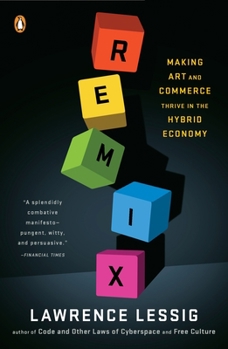Remix: Making Art and Commerce Thrive in the Hybrid Economy
Select Format
Select Condition 
Book Overview
The reigning authority on intellectual property in the Internet age, Lawrence Lessig spotlights the newest and possibly the most harmful culture -- a war waged against those who create and consume art. America's copyright laws have ceased to perform their original, beneficial role: protecting artists' creations while allowing them to build on previous creative works. In fact, our system now criminalizes those very actions. Remix is an urgent, eloquent...
Format:Paperback
Language:English
ISBN:0143116134
ISBN13:9780143116134
Release Date:September 2009
Publisher:Penguin Publishing Group
Length:352 Pages
Weight:0.05 lbs.
Dimensions:0.8" x 5.1" x 7.7"
Age Range:18 years and up
Grade Range:Postsecondary and higher
Customer Reviews
4 ratings
one of the most intellegent people out there
Published by Thriftbooks.com User , 15 years ago
Reading or listening to genuinely intelligent people's work is one of my favorite things. Larry Lessig is definitely one of those people. I highly recommend his work, it will make you smarter!
Think of the children
Published by Thriftbooks.com User , 15 years ago
The core of this book is a question about what kind of world we want to create for future generations. Lessig presents an argument that the natural way humans interact with content is to remix it, as we are used to doing with text. Just as we take no offense when somebody quotes our text in their own communication, we should resist the urge to control "quoting" of our digital content. This is a passionately written book, but it takes some engagement with the issue to really enjoy it. Starting with another of Lessig's books, The Future of Ideas: The Fate of the Commons in a Connected World, might help a reader get into the subject, but once he or she realizes the consequences of culture's legal stance on this issue, Lessig's perspective becomes invaluable to have around. That book more sets out the conditions created by sharing economies, where Remix looks for how art and business can survive under these conditions. Lessig's lessons on how businesses can thrive or fail as hybrids may help content-producers get a grip as the financial industry melts down. The main point, as I said, is about the world and culture we create for our children. Do we want a world where they have free "speech" in hundreds of digital "languages", or one where their natural abilities are locked down? Lessig offers advice on how to change law and ourselves to create a culture where our children's expression is cherished (for the sake of their education and their community-building). He wants to start a conversation about how business can thrive among sharing economies as well. This book will be a key perspective in that conversation.
The Handbook for a Creative Future!
Published by Thriftbooks.com User , 15 years ago
Remix is the culmination of Lawrence Lessig's tireless arguments about the importance of creativity being able to be built on the foundations of culture that already exists, a pathway only open if the extremes of copyright are sobered and a shared, free commons is actively promoted and created. Some of the arguments will be familiar from Lessig's previous book Free Culture: The Nature and Future of Creativity but Remix takes them to a new depth. More to the point, Remix, despite being written by a lawyer, is an extremely accessible work that makes its arguments with humour and is easy to read. The argument is compelling, and Remix has a place in the libraries of schools and universities and the bookshelves of anyone interested in a creativity culture built on the successes of the past with the tools of the future. (My only criticism would be this book is very US-centric, but that's Lessig's prerogative; others needs to extend these arguments beyond national boundaries.)
This book is important.
Published by Thriftbooks.com User , 15 years ago
And it's important because it focuses on something that seems to be totally ignored by everyone except Lawrence Lessig, and that's the idea that an entire generation of young people are self-identifying as criminals for doing something that, to them, is totally normal. Lessig also talks about sharing/commercial/hybrid economies, and elucidates the differences in each of them. The anecdotes throughout the book are all enjoyable, interesting, and serve as profound, thoughtful backup to all of Lessig's main points, making the book easily readable for anyone not an intellectual property scholar. Overall Lessig presents a compelling, well-reasoned angle on a situation that gets a completely inappropriate treatment nearly everywhere else.




